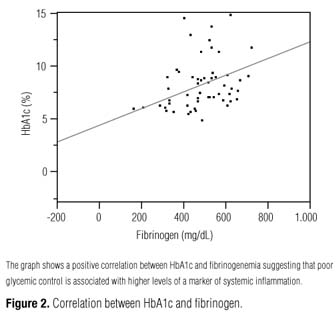OBJECTIVE: The aim of this study is to assess the clinical care pattern and to compare the lipid and glycemic profile in a group of diabetic patients undergoing both hemodialysis (HD) and peritoneal dialysis (PD) and to correlate these data using biomarkers of cardiovascular risk. SUBJECTS AND METHODS: The first phase consisted in performing a survey on demographic data, questions about the medical team and glycemic control. In the second phase, patients were assessed through laboratorial data on their glycemic and lipid profile at a single center for HD and PD. RESULTS: 91 patients was the total population; 70 patients (77%) answered the survey; 66 patients (94%) considered the nephrologist the physician responsible for caring for their glycemic control. Second phase: 59 patients were assessed, 29 undergoing HD and 30 undergoing PD. Fifty-seven percent of the patients had HbA1c above 7%; the level of glycemic markers in patients undergoing peritoneal dialysis was significantly higher than in patients undergoing hemodialysis: HbA1c (9.37 ± 0.5) vs. (7.37 ± 0.49) p < 0.01; fasting glycemia (170 ± 15) vs. (126 ± 15) mg/dL p < 0.05. We found a positive correlation between HbA1c and hyperfibrinogenemia (r = 0.4437, p < 0.0005). CONCLUSIONS: The data reveal that glycemic control in diabetic patients undergoing renal replacement therapy (RRT) is neglected. Peritoneal dialysis is related to the worst level of glycemic markers, possibly due to the glucose content in the dialysis solution, and higher levels from HbA1c have a positive correlation with hyperfibrinogenesis in this population.
Glycemic control; insulin resistance; chronic kidney disease; peritoneal dialysis; inflammation




